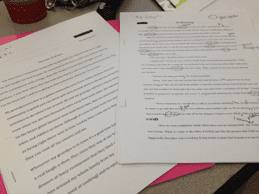When I became an English teacher I really disliked the idea of students writing a paper, turning it in, and me staring at the pile for two weeks on my dining room table while I walked past it to watch Netflix. That pile was always waiting for me, just taunting me. I’d come up with ways to bribe myself to grade. Grade five papers right now and then go to Target. Grade five more and you can have Starbucks. I’d find myself sorting them into meaningless piles, and then inevitably the pile would get shuffled in my bag and I’d have to find a new way to procrastinate. There had to be a better way!
My favorite teaching strategy in the whole wide world is from Socrates himself, the Socratic Seminar. Why not use that strategy to discuss writing as well? The students own the discussion, and this time we’d be discussing their own work!
Before Workshop
Here’s how it works. When students finish the first draft of their paper, they turn it in via Google Docs. I remove their names and assign a number to it. I also split the class into two.
After I number all the papers, I make copies for each group. I then create a schedule, and alternate every other day for each group. This takes some careful planning, but I usually had three papers presented in one period (49 minutes).
Next, I copied student-friendly rubrics for my students and printed them in the packet along with the schedule, rules for the workshop, and focus questions to guide the discussion.

I posted the schedule digitally as well so that students were always aware of what was coming up next for them in class.
We discussed what critical feedback would look like in advance, using my own writing as an example. I projected a descriptive paragraph on the board that I had written, and I asked students for feedback.
We discussed how feedback should be specific, helpful, and not derogatory. We also talked about how feedback that is overtly positive doesn’t help the writer get better. Explain why you liked it specifically, and suggest ways to continue to do that throughout the paper.
Students were required to read and make comments on the papers that were going to be discussed. This was their required homework for the evening. I explained that it was critical that they annotate the text and make comments, otherwise their score would have no support or explanation. They assigned each paper a score out of six based on a six traits rubric.
[contextly_auto_sidebar]
During Workshop
Arrange the desks in a circle to start. Sit next to any students who may need some encouragement from you to stay on task.
Students will have a zillion questions, and that’s okay on the first day. Your excitement will rub off, I promise. General rules for discussion include participating in a respectful way, not yelling over each other, and not hogging the conversation. In a Socratic seminar, students do not raise their hands.
We often spend a few minutes demonstrating what not to do, which they greatly enjoy. I ask them to speak all at the same time and show them how difficult that is. We discuss how conversations work in general, and that they don’t flow very well when we raise our hands. I also included some sentence starters in their packets such as “An interesting point I saw was…” “Something I would like to see more of is…”
If a student does not come prepared with their three papers graded for the day, they cannot participate in the discussion, and will lose those discussion points.
For each paper, a different student leads the discussion as facilitator. The facilitator marks down which students spoke and keeps track of time. The also had to keep the discussion going by asking questions, and keeping the conversation focused.
Each student was asked to participate twice during the entire class period, but most students spoke much more.The student author who wrote the paper in discussion could not speak until the end, but could also remain anonymous if they chose. I did have some students chime in during discussion in defense of their papers, so I had to jump in and remind students not to speak if their paper was currently being discussed.
At the end of each discussion, students pulled off the paper that was discussed and passed it down to me. I stapled all of the edited papers, along with mine, and gave it to the author at the end of the period. The student then had two days to revise and edit their paper based on the feedback they received from me and their peers. They also had to turn in the edit packet as well.
What do I do with the other half of the class?
They’ll sit and behave and be perfect, right? Well, yes, if they have something to do. You can always give them an alternate assignment or review work to do. However, it should be something that requires minimal assistance from you, as you’ll be busy during the discussion with your group. On days students were not discussing, my students could take the time to read and make comments for papers the next day, or if their paper had already been discussed, they could make edits during this time.
After Workshop
When students turned in their final papers I was already familiar with what they had written, and I could also see how well they took the feedback they were given and applied it to their writing. It definitely helped me to be more thoughtful in my grading, and more intentional.
Students came away with a better understanding of their purpose when writing, and received authentic feedback. All students were demonstrating the ability to discuss a paper and thoughtfully annotate and edit while using a rubric as well.
Yes, some students struggle with the discussion aspect, but it is an important standard and life skill. If you have students with who are hesitant to discuss, sit down with them and talk about how they can participate in a meaningful way. The wonderful thing about this strategy is that students have important things to say written in their notes. Remind students that their opinion and expertise is not only welcome, it’s helpful and valued. If you are unfamiliar with Socratic Seminar, I highly recommend taking a quick trip to google and checking it out, as it is hands down my favorite way to engage students in a discussion.
If you are as excited as I am about trying out Writer’s Workshop, but you don’t have time to do the legwork of creating calendars and rules and what not, feel free to check out my Writer’s Workshop resource on TpT.
Have you tried Socratic Seminar in Writer’s Workshop? How do you manage it? Come and share in our WeAreTeachers HELPLINE group on Facebook.
Plus, read how another teacher runs Socratic Seminar in her classroom.

